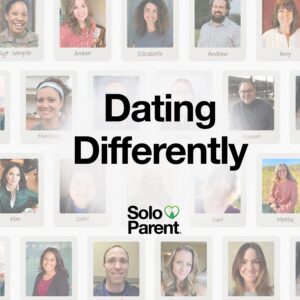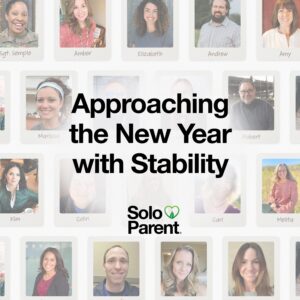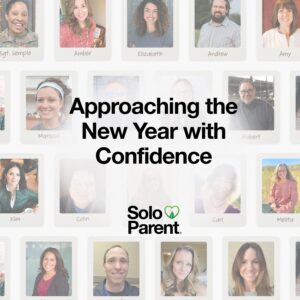There’s something haunting about the silence that comes after your life changes. The absence of footsteps that once echoed through the hallway. The stillness of a trash bin that used to magically make its way to the curb. The quiet, everyday moments that scream: “You’re on your own now.”
Solo parents know this disorientation intimately. It’s not just the big decisions or major losses that break you, it’s the ordinary routines that now feel impossibly heavy. Tasks you never thought twice about suddenly feel like reminders of everything that’s gone. That’s what makes this week’s conversation so necessary. Because healing doesn’t begin with pretending life is the same. It begins with the courage to face the truth: life is different now. And it will be.
This episode speaks directly to solo parents navigating the pain of accepting a new reality, the heartbreak of watching your children grieve what used to be, and the quiet ache of learning to live forward when everything in you wants to go back.
Marissa Lee, author and single parent, joins us with honesty, wisdom, and a story that holds space for both heartbreak and healing. From losing her husband without warning to walking her boys through milestones he’ll never see, Marissa invites us to name our pain, sit with it, and let it shape us for the better.
There isn’t a fast-forward button through grief. But there is a way forward.
Key Insights from This Episode
- Acceptance is a process, not a one-time event.
- Our kids will experience milestones differently, and we must have the courage to notice.
- Embracing the new normal is key to healing, but it doesn’t mean we have to like it.
Acceptance is a process, not a one-time event.
Whether your solo journey began through divorce, death, or abandonment, grief doesn’t follow a clean timeline. It comes in waves, sometimes like a tornado, spinning tightly and hitting hard, then moving out wider and slower the more you allow yourself to feel.
Marissa shared how she longed to “glue the broken vase back together,” hoping life could look the same again. But the truth was unavoidable: “My new life has to be different,” she said. There’s no going back. And that realization, while painful, was also freeing.
Elizabeth Cole, a single parent, described how sitting in the bath and finally saying out loud, “I’m never going back,” became a turning point in her healing. It didn’t erase the grief, but it gave it shape, and gave her strength to keep moving.
Our kids will experience milestones differently, and we must have the courage to notice.
There are few things more painful than watching your child hope for something you know can’t happen. Elizabeth recounted a conversation with her son Jax, who still held out hope that she and his dad might get back together. His questions—”What if it meant I’d die if you didn’t?”—were dark, but honest. And they cracked open an important truth.
“We can’t help our kids process their pain if we haven’t faced our own,” she said. Had she still been secretly hoping for reconciliation, she never could’ve responded with clarity and compassion.
Marissa also shared how the grief in her household resurfaces at every milestone. When her son Colton graduated, he received a quilt made of his father’s old shirts, bittersweet and sacred. “The closest he’ll get to his dad on graduation day is a memory,” she said. Moments like these are complex. Our children’s grief is layered and quiet. It’s up to us to be attentive, not dismissive.
Embracing the new normal is key to healing, but it doesn’t mean we have to like it.
This part is complicated. Acceptance doesn’t mean we celebrate the change or stop missing what was. It means we stop pretending things can go back to the way they were—and start building a life where we are.
Marissa said it plainly: “There are times I still daydream about when things were easier. Acceptance doesn’t mean I like it. It just means I keep showing up anyway.”
Robert Beeson, Founder/CEO of Solo Parent, reminded us of the metaphor of the bison, how it’s the only animal that runs into the storm, not away from it. “The storm passes faster that way,” he said. Avoiding pain might delay it, but it never spares us from it.
Community is one of the things that helps us face the storm. Solo Parent Groups are the kind of safe place where you don’t have to explain every detail of your pain for people to get it. You can just say, “I was overwhelmed by grief this week,” and others will nod in recognition. That matters.
Listener Question
“What’s one app that’s actually made your life easier and one that you use just for fun?”
Robert answered immediately: “ChatGPT has been a game-changer for everything from practical help to creative tasks. And for fun? TikTok, for sure.”
Elizabeth’s tools of choice were fitness-based. “Strava, Garmin, and the Oura Ring help me take care of myself,” she said. “And Instagram, people are so clever, it makes me laugh.”
Marissa leaned into functionality: “Banking apps changed the game for me and my kids. And I’ve got to admit…Prime Day shopping has been my guilty pleasure lately.”
If you’re finding it hard to accept your new normal, you’re not alone. You don’t have to love where you are to start healing. You just have to be willing to show up for what is.
Stay Connected + Get Support
We want to answer any Solo Parent questions you may have. Submit your listener questions HERE.
Additional Resources:



